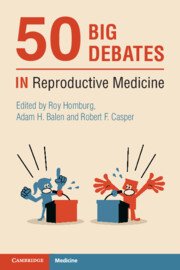Book contents
- 50 Big Debates in Reproductive Medicine
- Series page
- 50 Big Debates in Reproductive Medicine
- Copyright page
- Contents
- Contributors
- Foreword
- Introduction
- Section I Limits for IVF
- Section II IVF Add-ons
- Section III The Best Policy
- Section IV Embryology
- Section V Ethics and Statistics
- Section VI Male-factor Infertility
- Section VII Genetics
- 38A Genome Editing Should Be Allowed for the Prevention of Life-Threatening Genetic Diseases
- 38B Genome Editing Should Be Allowed for the Prevention of Life-Threatening Genetic Diseases
- 39A PGT-A Should Be Offered for Recurrent Implantation Failure
- 39B PGT-A Should Be Offered for Recurrent Implantation Failure
- 40A PGT-A Should Be Offered for All Women
- 40B PGT-A Should Be Offered for All Women
- Section VIII Ovarian Stimulation
- Section IX Hormones and the Environment
- Index
- References
38A - Genome Editing Should Be Allowed for the Prevention of Life-Threatening Genetic Diseases
For
from Section VII - Genetics
Published online by Cambridge University Press: 25 November 2021
- 50 Big Debates in Reproductive Medicine
- Series page
- 50 Big Debates in Reproductive Medicine
- Copyright page
- Contents
- Contributors
- Foreword
- Introduction
- Section I Limits for IVF
- Section II IVF Add-ons
- Section III The Best Policy
- Section IV Embryology
- Section V Ethics and Statistics
- Section VI Male-factor Infertility
- Section VII Genetics
- 38A Genome Editing Should Be Allowed for the Prevention of Life-Threatening Genetic Diseases
- 38B Genome Editing Should Be Allowed for the Prevention of Life-Threatening Genetic Diseases
- 39A PGT-A Should Be Offered for Recurrent Implantation Failure
- 39B PGT-A Should Be Offered for Recurrent Implantation Failure
- 40A PGT-A Should Be Offered for All Women
- 40B PGT-A Should Be Offered for All Women
- Section VIII Ovarian Stimulation
- Section IX Hormones and the Environment
- Index
- References
Summary
While far-future dystopian outcomes are frequently posited by opponents of genome editing, these scenarios are of little relevance to practical reproductive medicine. The more interesting question is this: Should we go ahead with genome editing now? I shall argue that the answer is yes, we ought to proceed without undue delay. With current technology (most notably CRISPR), genome editing has the potential to prevent life-threatening genetic diseases. The main arguments commonly raised against going ahead are threefold: 1. Current technology should be used instead of genome editing 2. Genome editing technology is presently too dangerous 3. Allowing genome editing will lead to misuse of the technology. In my view these objections do not amount to strong grounds against genome editing. I shall consider each in turn.
- Type
- Chapter
- Information
- 50 Big Debates in Reproductive Medicine , pp. 194 - 196Publisher: Cambridge University PressPrint publication year: 2021



